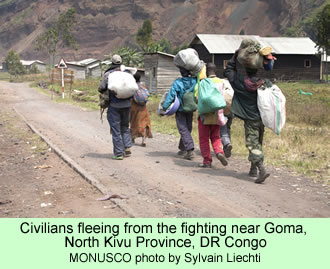Another crisis has been threatening the Mbuti living in refugee camps outside Goma, in eastern Congo, as the rebel group M23 prepares to attack the city, the capital of North Kivu Province. M23 indicates they will attack if harassment of Tutsi people in Goma is not stopped by the DR Congo government. The Mbuti in the resettlement camps fear they may suffer from renewed fighting, as they have in the past from the various armies and rebel groups that have surged back and forth across eastern Congo.
 Bishop Jean Marie Runiga, the political leader of M23, issued a statement two weeks ago denouncing mob violence against the Tutsi, who come from neighboring Rwanda. “If we see they are being mistreated and the government has failed to safeguard them and MONUSCO has failed to protect them; we shall capture Goma, that is the truth because our role is to protect the civilian communities,” he said. MONUSCO is the United Nations Organization Stabilization Mission in the Democratic Republic of the Congo.
Bishop Jean Marie Runiga, the political leader of M23, issued a statement two weeks ago denouncing mob violence against the Tutsi, who come from neighboring Rwanda. “If we see they are being mistreated and the government has failed to safeguard them and MONUSCO has failed to protect them; we shall capture Goma, that is the truth because our role is to protect the civilian communities,” he said. MONUSCO is the United Nations Organization Stabilization Mission in the Democratic Republic of the Congo.
The rebel group is well-armed and has a growing number of fighters, though the government of Rwanda denies that it is supporting it. M23 made significant advances against the army of the DR Congo several weeks ago, so the government and MONUSCO are taking their warning about Goma seriously. The UN body quickly moved armored vehicles into major road intersections in the area. The M23 group is named after a peace deal in 2009 that ended an earlier rebellion in North Kivu, a province rich in resources.
Hundreds of thousands of civilians have once again been forced to leave their homes. Both MONUSCO and rebel spokespersons indicate that M23 has pulled back from some of the positions it had seized. Casualties from the most recent fighting are not yet available.
In New York on July 16, the UN Security Council condemned the violence and demanded that outside support for the rebel groups must stop. The UN reported that at least one of their soldiers had been killed in the crossfire between FARDC, the Congolese armed forces, and M23 in North Kivu.
On Wednesday last week, All Africa.com reported that representatives of three different regional organizations that champion the Mbuti and the Batwa peoples of eastern Congo had met in Geneva to formulate strategies for preventing as much as possible additional human rights violations. PIDP-Kivu (Program Integration and Development of the Pygmy People in Kivu), UNIPROBA (United for the Promotion of Batwa), and COPORWA (the Community of Potters from Rwanda), held their Geneva workshop on July 11 through 13 to coordinate their responses to ongoing violence against the Mbuti and Batwa.
The representatives reviewed possible methodologies and technologies for recording incidents, ways of activating early warnings of violence, and the possibility of establishing a human rights observatory which could monitor the situation. Patterns of violence against the Mbuti, also called variously Bambuti and Batwa, include murders, rapes, and using them as human shields. This violence has been part of their lives since the original 1994 genocide in Rwanda. The continuing wars since then have perpetuated these abuses and with the warfare renewing over the past few weeks, once again the Mbuti fear that they will become the first targets of the violence.